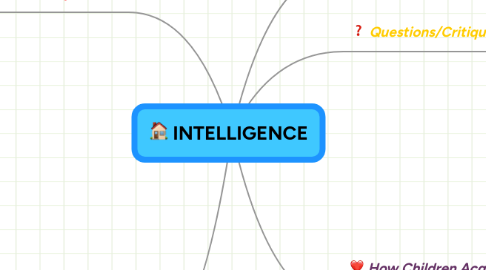INTELLIGENCE
by Misha Begay


1. Components
1.1. Steinberg- intelligent behavior involves adaptation, one must modify their responses to deal successfully with specific environmental conditions or modify the environment to better fit their own needs.
1.2. Steinberg- intelligent behavior sometimes involves the individual to use prior experiences which plays a crucial role.
1.3. Steinberg- proposes that numerous cognitive processes are involved in intelligent behavior, interpreting new situation in ways that promote successful adaptation, sustaining concentration on a task, deciphering information and identifying effective problem solving strategies. etc...
1.4. Group Differences in Intelligence
1.4.1. Culture Bias- when one or more of its items either offend or unfairly penalize people of a particular ethnic background, gendar, or socioeconomic status, to the point that the test has less predictive and constraint validity for those individuals.
1.4.2. Socioeconomic Status- affacts the quality of prenatal and postnatal nutrition, availibility of stimulating books, toys, access to educational oppurtunities and other environmental factors that are likely to affect intellectual development and test performance.
2. Theorists
2.1. Spearman's G: General factor in intelligence that influences performance in a wide variety of tasks and content.
2.2. Cattell's Fluid and Crystallized Intelligence: ability to acquire knowledge and adapt to new situations. Knowledge and skills accumulated from proir experiences and school.
2.3. Gardner's 8 Multiple Intelligences: Linguistic, Logical-Mathematical, Spatial, Musical, Bodily Kinesthetic, Interpersonal, Intrapersonal, and Naturalist.
2.4. Steinberg's Triarchic Theory: 3 Factors, The Environmental Context, Prior Experiences, and The Cognitive Process.
3. Definition
3.1. Intelligence: the ability to benefit from experience and thereby modify future behaviors to accomplish new tasks successfully.
4. Questions/Critiques
4.1. Why are there so many theories?
4.2. Are they now more culturally sensitive?
4.3. Are they accurate for a child of possible Special Needs?
4.4. Are they accurate for a normal child?
4.5. Which theory is most relevant in testing a child?
5. How Children Acquire Intelligence
5.1. Nature and Nurture play a role in the development of intelligence. Also, environmental differences play a role in intellectual development.
5.2. Childrens genes require environmental support to work efficiently.
5.3. In an impoverished environment a child with a lack of adequate nutrition and little stimulation- heredity may have little to say about the extent to which children develop intellectually.
5.4. In an ideal environment a child with nutrition, proper parenting practices, and educational oppurtunities are optimal and age appropriate. Heredity is likely to have a significant influence on children's IQ scores.
5.5. As children grow they choose their environment and their experiences. A child with quantitative reasoning may choose something that nurtures their inherited talents or a child of average quantitative abilities may choose something less challenging.
5.5.1. Four factors are at (inter)play: Genetic Activity affects Neural Activity, which affects Behavior, which affects the Environment.
